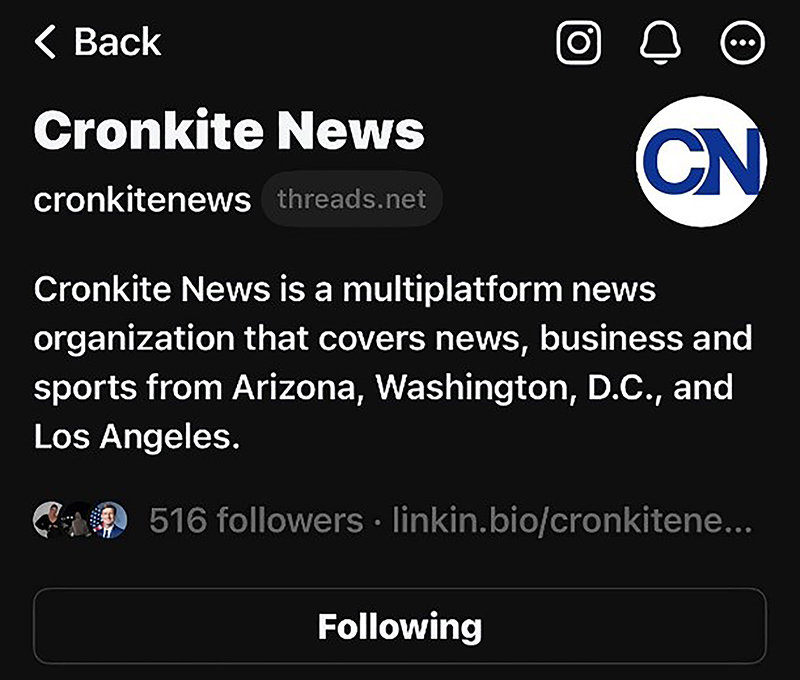
Arizona Secretary of State Adrian Fontes is an active user of the new Threads social media app, posting everything from elections official business to politics to his opinion of Bob Seger and, here, a photo from an Arizona Diamondbacks game during a trip to Washington, D.C. (Photo courtesy Arizona Secretary of State Adrian Fontes)
WASHINGTON – Among the 100 million users who reportedly signed up last month for Threads, Meta’s new social media platform, were Arizona politicians from both state and federal office and from both sides of the aisle.
Some used it to send campaign messages or to reach out to constituents. Some used it for family announcements or to poll people on their favorite Sonoran hot dog. Some have not posted at all yet, but rushed to get on the platform nonetheless.
Yini Zhang is not surprised.
The assistant professor in communications at the University of Buffalo said that in order to reach the most people, politicians must make themselves available on as many platforms as they can. That’s why it’s not uncommon for one politician to have accounts on Twitter, Instagram, Facebook, TikTok, Truth Social and now, Threads.
“For politicians to get their messages out and to reach as many people as possible, it is important to adopt this kind of all-out strategy to create accounts on multiple platforms, particularly if a given platform happens to be the place where they want to meet their supporters,” Zhang said.
Threads might be that place, said Andrew Selepak, a social media professor at the University of Florida. Anyone with an Instagram account can have a Threads account and set-up is quick. He said Threads also enjoys robust financial support from Meta and potential access to Instagram’s 2 billion users.
Selepak said Threads is another avenue for politicians to reach their constituents and to control the messages constituents see.
In his first post on Threads, Rep. Greg Stanton, D-Phoenix, reintroduced himself to constituents with a “refresher on what I’ve been fighting for & will continue fighting for.” Stanton, who has both professional and personal accounts, has posted about town hall meetings, Sky Harbor neighborhood improvements, record-breaking temperatures and the state’s water supply issues.
Despite the buzz around Threads, Selepak does not foresee a lot of energy and marketing resources pouring into the app, which he thinks will instead become a place for repurposed content to find new audiences.
When Rep. Raúl Grijalva, D-Tucson, published a video of himself on Threads drawing on an official House of Representatives pad, he also posted his “GrijalvArt” to other social media platforms.
Selepak said that social media platforms are typically safe spaces for politicians to market themselves, and Arizona politicians are no exception. He pointed to Arizona Sen. Kyrsten Sinema, who left the Democratic Party last year to become an independent, saying it is probably easier for her to talk about her stances via her social media accounts than anywhere else.
“She’s not going to get friendly interviews on MSNBC, or Fox News or CNN,” Selepak said. “So for her, taking her message directly to voters, directly to the public through social media, is probably going to be her only friendly outlet where she can run.”
Sinema has a Threads account, but as of Aug. 1 she had not posted any content.
Post by @suzebuffView on Threads
Zhang said that in a world where everyone is online, politicians are competing for eyeballs and followers too. That means politicians are competing “with a multitude of different actors who try to get people’s attention and probably monetize people’s attention.”
“So they’re in this game that is pretty, I would say, cutthroat so they have to devise some messaging strategies,” Zhang said. “For example, they might go negative, in order to arouse people’s emotions so that they can be galvanized into retweeting or sharing their posts or talking to their friends offline about a given issue.”
Rep. Ruben Gallego, D-Phoenix, has announced a bid for Sinema’s Senate seat next year. His campaign has targeted both Sinema and failed GOP gubernatorial candidate Kari Lake, who is considered another potential Senate candidate. Gallego used Threads, for example, to outline “The difference between me and @KariLake? She’s an extremist who wants to ban abortion.”
But Gallego, like other politicians, also uses social media in an effort to be relatable to voters.
Zhang said it’s a trend researchers have already seen in politicians’ online messaging. By the very nature of social media platforms, interactions tend to be casual, she said.
“I think these two things, this kind of messaging strategy and the medium, they go hand in hand,” Zhang said. “They’re very compatible.”

Politicians arem’t the only ones on Threads. You can follow Cronkite News on Threads, too.
For example, Gallego announced the birth of his daughter on Threads, along with other platforms. “These past few days together as a new family have been wonderful, and we are lucky that mom and daughter are healthy and home,” wrote Gallego. He has since posted about his favorite sandwich and being on “diaper duty.”
And Grijalva asked followers where they get their hot dogs: “Favorite Sonoran hot dog joint?” he posted, before replying to his own thread with, “Also, #environmentaljusticeforall.”
Rep. Eli Crane, R-Oro Valley, and Rep. Juan Ciscomani, R-Tucson, have joined the Threads app, but Ciscomani has not posted anything and Crane has only reposted a news story from a month ago.
Other politicians with Threads accounts include Gov. Katie Hobbs, who has no posts yet at @govhobbs, and Phoenix Mayor Kate Gallego, who started posting recently.
State legislators who have signed up include:
• District 9 Democratic Rep. Lorena Austin.
• District 9 Democratic Rep. Seth Blattman.
• District 23 Democratic State Sen. Brian Fernandez.
• District 4 Republican Rep. Matt Gress.
• District 20 Democratic Rep. Alma Hernandez.
• District 8 Democratic Minority Whip Melody Hernandez.
• District 5 Democratic Rep. Jennifer Longdon.
• District 18 Democratic Rep. Christopher Mathis.
• District 24 Democratic Rep. Analise Ortiz.
• District 11 Democratic Rep. Marcelino Quiñonez.
• District 16 Republican Sen. T.J. Shope.
• District 4 Democratic Rep. Laura Terech.
While some of them have posted, some have not. But Arizona Secretary of State Adrian Fontes is active on the new platform, as on others.
Fontes, who has both a professional and personal account, has posted on serious policy as well as talking about the World Cup and asking followers what the state’s “6th C” should be, after climate, cotton, copper, citrus and cattle. Responses included chimichangas, carne asada, cacti and craft beer.
While in Washington, D.C., for a meeting of the National Association of Secretaries of State, he posted that he “cannot wait to get out of the humidity.”
Selepak said these types of non-controversial, non-political posts are intentional: They make politicians more relatable and more human, he said. Selepak referenced the “beer question,” which asks voters to choose which politician they would prefer to have a beer with.
“When it comes to politics and elections, as much as we may wish and hope that people are voting based on policy issues, it often just comes down to likability,” he said.

